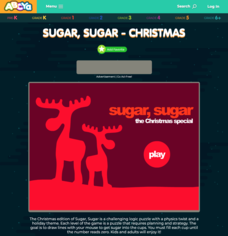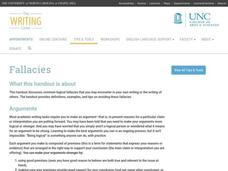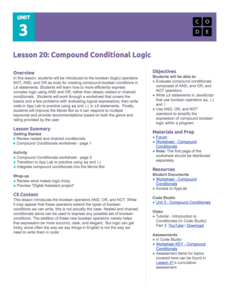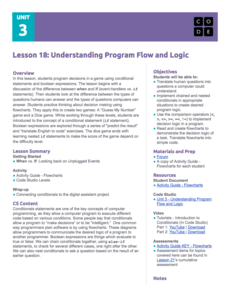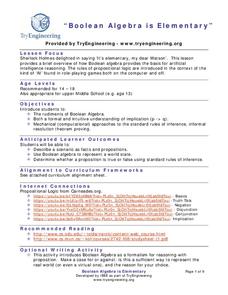Intel
Forensics: Get a Clue
Although the methods are all scientific, forensic science was started by police officers rather than scientists, who relied on observation and common sense. Young detectives use many tools to solve crimes around the school in a...
Curated OER
Batter Up! Math Stations
Math stations that review important concepts with the real-world example of baseball.
Curated OER
Lesson: Proposal for a School Sculpture
After discussing the artistic elements and design process needed to construct the modern sculpture, Lao Tzu, kids get logical. They consider the purposeful use of space in the sculpture, design a modern piece for a specific space at...
Curated OER
Likely Outcomes
A coin toss is a simple and fun way to help youngsters discovery probability. Preferably in partners, they first predict what would happen if they tossed two coins 48 times. How often would two heads show up? Two tails? How about one of...
K20 LEARN
Simply Elementary, Watson!
Explore the process of inductive and deductive reasoning. A collaborative instructional activity has some groups apply an inductive approach and others a deductive approach. Through class discussion, scholars compare their processes and...
WE Charity
Exploring the Four Leadership Styles
What is your leadership style? Tweens and teens independently complete a Four Leadership Styles worksheet. Once completed, they use a leadership code to identify their prominent leadership style. Class members gather by style, brainstorm...
Teach Engineering
Computer Simulation of an Artificial Neural Network
Ready to learn about machine learning? Pupils explore neutral networks and machine learning by analyzing the logic used in a single perceptron model. They consider its weaknesses and then use a multi-layer perceptron model to run...
ABCya
A Blocky Christmas!!
And you thought holiday shopping was tough! A fun Christmas game prompts players to direct a star block into position with the arrow keys on their keyboard. As they progress through levels, they use the star block to move additional...
ABCya
Sugar, Sugar - Christmas
The holidays wouldn't complete without lots of sugar and a little bit of strategy! A logic game challenges players to distribute falling sugar into a varying number of mugs using lines drawn from their mouse.
College Board
2008 AP® Computer Science A Free-Response Questions
Get the code right. A detailed resource provides pupils and teachers of computer science courses with released items from the 2008 exam. Questions range from studying code in a case study to creating code to perform specific tasks....
Florida Institute of Technology
Who Owns the Zebra?
Five women of different ethnicities and living in differently colored houses own different pets, drink different beverages, and work in different professions. Who is who? Solve a logic puzzle that provides 14 clues about connections...
University of North Carolina
Fallacies
All teacher workrooms contain a coffee maker, therefore all teachers must be addicted to coffee. That sentence represents a logical fallacy (although it may be true from some), a topic the seventh installment in the 24-part Writing the...
Virginia Department of Education
Logic and Conditional Statements
If there is a conditional statement, then there is a hypothesis and conclusion. Pupils learn how to identify the parts of conditional statements. Class members continue to work with conditional statements and rewrite them in their many...
Code.org
Looping and Simulation
Young computer scientists continue programming with while loops by creating a program to simulate coins flipping.
Code.org
While Loops
Bring your pupils in the loop with while loops. Scholars learn how to modify conditional statements to produce while loops in the 14th activity of the series. They use flowcharts to understand loops and then program some examples of loops.
Code.org
Digital Assistant Project
Scholars apply previously learned skills to create a functional computer program. They produce a digital assistant incorporating string commands and complex conditional logic.
Code.org
Compound Conditional Logic
Scholars explore compound conditional logic and learn to use the Boolean operators AND, OR, and NOT within conditional statements by incorporating these operators to improve a previously created app.
Code.org
Introduction to Conditional Logic
On one condition ... explore how to use conditionals within conditionals. Scholars apply conditional statements to improve upon the app they built during a previous lesson. They also learn about nested conditionals in the 11th lesson of...
Code.org
Understanding Program Flow and Logic
Explore decision-making logic in programming computer games. The 10th installment of a 21-part unit teaches scholars how to apply conditional statements and Boolean expressions. They use these concepts to create a "Guess My Number" game...
TryEngineering
Boolean Algebra is Elementary
See how Boolean algebra relates to video games with a lesson that teaches young scholars how to use Boolean algebra to create rules for a virtual world. They test the rule base for consistency in groups.
Beauty and Joy of Computing
Unsolvable and Undecidable Problems
Try as you might, some functions just cannot be computed. The lab introduces the class to the possibility of unsolvable problems. The fourth lesson in a series of seven begins with a logic problem, then progresses to looking at functions...
Education Development Center
Language of Algebra
Don't rush into algebra, let learners visualize, guess, and predict their way to a successful math career. The introductory unit incorporates beginner algebraic concepts with shapes instead of variables. Young mathematicians use a...
Computer Science Unplugged
The Peruvian Coin Flip–Cryptographic Protocols
A digital flip. Introduce your classes to cryptographic protocols using and, or, and not gates. Groups create a complete circuit to convert a binary number into another one. This type of one-way function allows pupils to verify the...
Mathematics Vision Project
Module 6: Congruence, Construction, and Proof
Trace the links between a variety of math concepts in this far-reaching unit. Ideas that seem very different on the outset (like the distance formula and rigid transformations) come together in very natural and logical ways. This unit...










